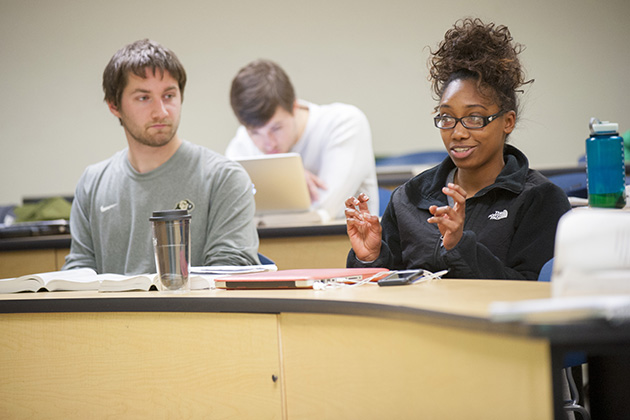
While most of their peers were recharging at home over winter break, a growing percentage of UConn students were speeding their progress toward a degree by taking intensive winter term courses.
Almost 1,700 students signed up this year for the three-week courses, the highest number ever enrolled in the winter term program. Of those, almost 900 took their courses online, an area where the growth has been particularly noteworthy due to the convenience and variety of the offerings.
Many students who take the classes say they want to fulfill a requirement, catch up, or earn additional credits to reach graduation more quickly. Winter term – previously known as intersession – is also popular with international and out-of-state students who stay on campus during the break, and who can save money by paying the same per-credit amount for winter term courses as in-state students.
UConn’s summer and winter programs are part of the University’s broader vision of providing a range of academic opportunities for its students, helping them graduate more quickly and therefore save money on tuition.
“Taking advantage of several winter and summer offerings across one’s UConn career can add up fairly quickly to a semester’s worth of coursework,” says Susanna Cowan, UConn’s director of summer and winter programs.

She said students can take advantage of the smaller sizes in winter courses to have more discussion with classmates and instructors. The three-week schedule also offers a chance to concentrate in a highly focused way on a single topic.
“Both in-person and online courses require students to fully immerse themselves in a subject,” Cowan says. “In return for the significant commitment this requires can come an academic experience that is richer and deeper than students may experience in the longer semester, when they are juggling multiple courses at once.”
The increased offerings in UConn’s eCampus online courses also have provided the best of both worlds for many students: the chance to go home for break, but also to earn credits during that time.
This year’s winter term began Dec. 29 and runs through Jan. 16. It offered a range of undergraduate, graduate, and special topics courses for current students, newly accepted freshmen, and transfer students; in addition, non-UConn students who take the classes may transfer the credits to their own institutions.
The course content is the same as what is offered during the regular semester, although instructors may bundle some topics together in order to condense it to fit in the intensive three-week timespan.
That doesn’t mean the quality is different, though. On the contrary, like other courses, the general education courses offered each winter must be approved by the University Senate’s General Education Oversight Committee, which ensures they don’t lose their academic integrity in their translation to the intensive format.
Online courses have been increasingly attractive to students across all academic terms, and UConn’s online winter courses in general education topics filled very quickly this year. In fact, about 900 of this winter’s nearly 1,700 winter intersession enrollments were for online courses.
Roger Travis, an associate professor of classics in UConn’s Department of Literatures, Cultures & Languages, has been teaching a classical mythology class online for five years. The students’ work includes watching recorded lectures, writing lab reports, completing assigned reading, and participating in online forum discussions about each module.
“Above all, I love the student engagement,” Travis says about teaching the online course. “In a longer session, even a six-week one, students inevitably lose focus. When they’re working on the course eight hours a day, day after day, they get much more command over the skills you’re trying to inculcate in them. Simply put, it makes for much better outcomes.”
The winter term students in his class also tend to come from more varied backgrounds than his students during the regular semester and to skew older, and this, he says, contributes to “serious engagement.”

Many students also find the winter term to be a critical piece of their package of requirements.
Randell Wilson ’15 (CLAS) needed one final general education course to complete his bachelor’s degree and found it during the current winter term in English 2407, “The Short Story.” By satisfying that final requirement, Wilson graduates now and will save literally thousands of dollars by avoiding a further semester and its associated costs.
“I didn’t know if I’d enjoy being in class three hours a day, five days a week, but I really have,” says Wilson, a Waterbury native commuting to Storrs each day for the class. “Honestly, I wish I would have been doing this all four years.”
Ellen Litman, associate professor of English and also a novelist and creative writing instructor, teaches Wilson and 14 others enrolled in English 2407. She says the students are very committed to their winter course, and that some drive an hour or more to attend, in addition to working at night.
“I’ve found the students to be incredibly engaged and alert, and they come prepared with great questions,” she says. “It’s a good opportunity for them to satisfy the need for the credits, and the discussions are always interesting.”


